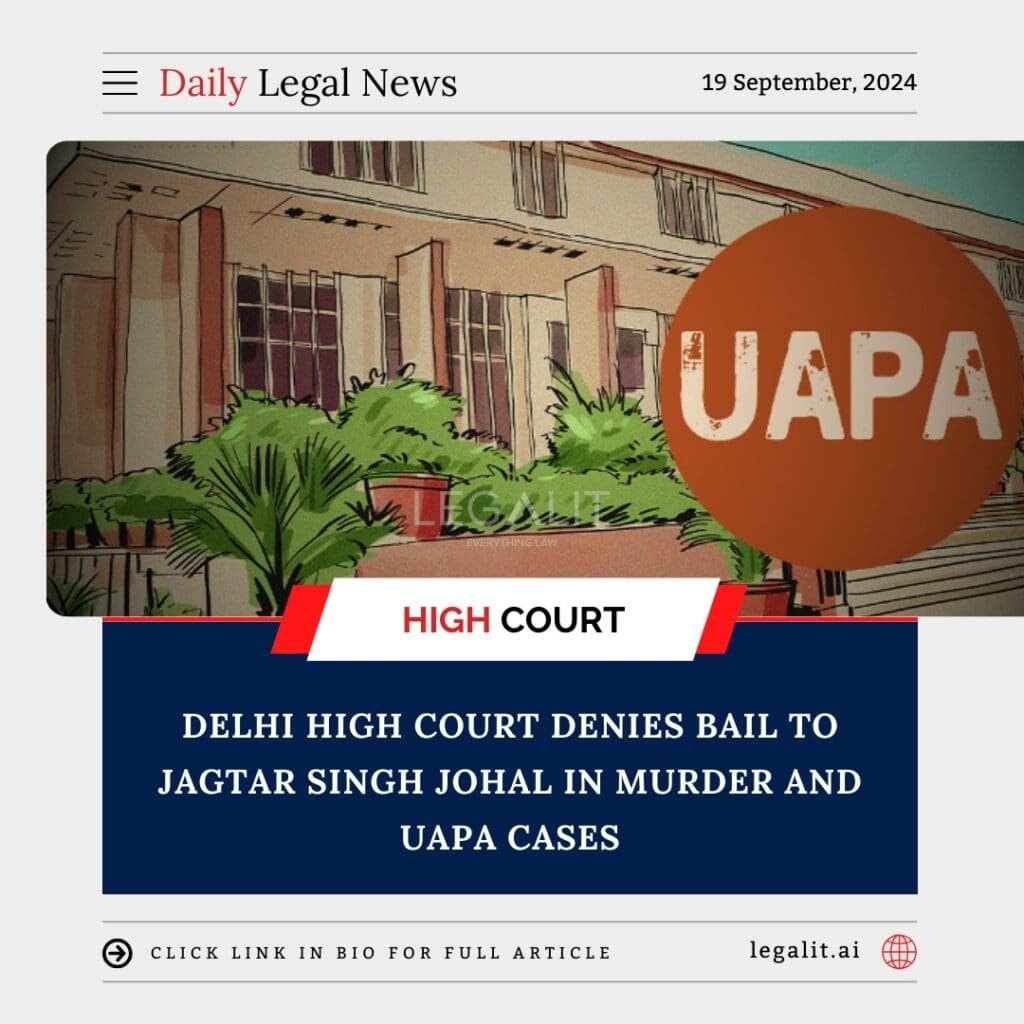
In a significant ruling, the Delhi High Court has denied bail to Jagtar Singh Johal, a British national facing charges under the Unlawful Activities (Prevention) Act (UAPA) and for his alleged involvement in multiple murder cases. The court’s decision underscores the seriousness of the charges against Johal, particularly his alleged involvement in terrorist activities and high-profile assassinations in India.
Background of the Case
Jagtar Singh Johal, a British citizen of Indian origin, was arrested by Indian authorities in 2017 during his visit to Punjab. He stands accused of involvement in a series of targeted killings in Punjab, allegedly orchestrated by a network of Khalistani separatists. The killings were reportedly part of a larger conspiracy to destabilize law and order in India by inciting communal tensions.
Johal is also charged under the stringent UAPA, India’s primary anti-terrorism law, which allows the government to designate individuals and organizations as terrorists and extend pre-trial detention periods without bail. His case has attracted international attention, with human rights organizations and British parliamentarians raising concerns over his alleged mistreatment in custody and prolonged detention without trial.
Court’s Rationale for Denying Bail
In its decision, the Delhi High Court highlighted several key factors that influenced its denial of Johal’s bail request:
- Seriousness of Charges: The court pointed out that Johal is facing extremely serious charges, including murder and terrorism under the UAPA. These charges, which involve allegations of participating in a conspiracy to carry out targeted killings, are grave in nature and require stringent scrutiny. Granting bail in such cases, the court noted, could compromise the ongoing investigation and pose a risk to public safety.
- Prima Facie Evidence of Involvement: The prosecution presented evidence suggesting Johal’s involvement in coordinating and funding the attacks that resulted in the deaths of high-profile individuals in Punjab. While the defense argued that there was no direct evidence linking Johal to the murders, the court found that the prima facie evidence was sufficient to deny bail at this stage of the proceedings.
- Application of UAPA: The court emphasized that cases under the UAPA are treated with greater caution due to the national security implications involved. The UAPA allows for extended detention without trial, and the court maintained that in Johal’s case, the need for a thorough investigation outweighed his right to bail. The court referred to the stringent conditions for bail under the UAPA, which mandate that the accused can only be released if the court is convinced that no prima facie case exists against them.
- Risk of Tampering with Evidence: Another factor in the court’s decision was the possibility that Johal, if released on bail, could influence witnesses or tamper with evidence. Given the organized nature of the alleged conspiracy, the court expressed concerns that releasing Johal could jeopardize the ongoing investigation into the broader network of individuals involved in the crimes.
International Concerns
The denial of bail to Jagtar Singh Johal has sparked renewed international interest in the case. Several human rights organizations, including Amnesty International and Human Rights Watch, have voiced concerns over Johal’s treatment in custody and the delay in bringing his case to trial. British lawmakers have also taken up the issue, urging the Indian government to ensure a fair and speedy trial for Johal.
Johal’s defense team has consistently denied the charges, arguing that he was targeted because of his activism in the UK, where he had been vocal about human rights abuses in Punjab, particularly during the 1984 anti-Sikh riots. His supporters claim that Johal was wrongfully detained and tortured to extract a confession, allegations that Indian authorities have denied.
Legal Implications and Next Steps
With the Delhi High Court denying bail, Jagtar Singh Johal will remain in custody as the case moves forward. His legal team is expected to challenge the ruling, possibly by appealing to the Supreme Court of India. However, under the UAPA, bail is rarely granted, especially in cases involving allegations of terrorism or national security.
The case has broader implications for how the UAPA is applied, particularly in cases involving foreign nationals. The UAPA has been criticized for its stringent provisions that allow for prolonged detention without trial, raising concerns about its compatibility with international human rights standards.
Conclusion
The Delhi High Court’s decision to deny bail to Jagtar Singh Johal underscores the gravity of the charges against him, particularly in the context of national security and terrorism. As the legal proceedings continue, the case will remain a focal point for human rights advocates and the international community, particularly regarding the use of the UAPA and the treatment of foreign nationals in India’s legal system.
[ajax_laod_more]